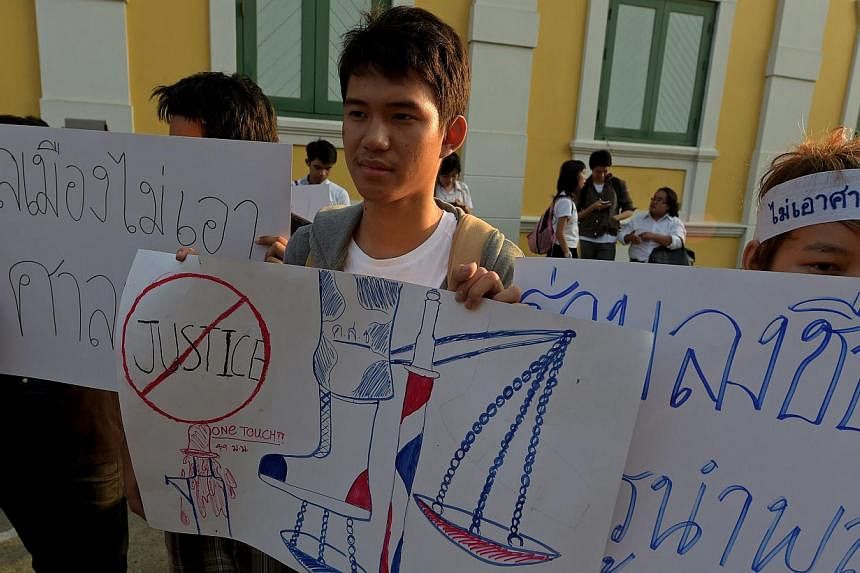The four men - an activist, a lawyer, a student and a taxi driver - were told to report at a Bangkok police station on Monday morning. They decided they would set off two days early.
In fact, they invited the public to walk some 50 km with them to drum up awareness about how they were about to face a military court instead of a civilian court for organising a political protest on Valentine's Day.
Forty-eight-year-old Pansak Srithep, clad in red sneakers, red arm sleeves and bearing a ring on his left ear, strode out of his house in Nonthaburi province neighbouring Bangkok on Saturday morning.
He was tailed by more reporters and security officers than supporters. The activist, whose 17-year-old son was killed during the 2010 military crackdown on anti-government protests, did not make it very far before being arrested. Police did not press charges. Instead, the activist charged that the police detained him illegally.
It was to be the start of a trying weekend for security officers.
Political gatherings of more than five people are banned. Thailand's military government wants political activities suspended while legal architects rewrite the country's political rules, but more groups like Mr Pansak's "Resistant Citizen" are emerging to test the boundaries of martial law, which remains in place almost 10 months after the military staged a coup.
The junta is being pressed on other fronts: Over the past week, coup-maker and Prime Minister Prayuth Chan-ocha had to suspend plans for a new land and building tax amid opposition from businesses and the middle class.
Meanwhile, after he ordered the transfer of the permanent secretary for health Narong Sahametapat to an inactive post last week, more than 500 supporters reportedly swarmed the ministry to support the shunted officer.
The initial fear that gripped anti-coup activists immediately after the military takeover is starting to ebb.
Graduate student "Champ" has been arrested twice since the coup last May. The first time was for eating a sandwich while reading George Orwell's dystopian novel 1984 - adopted as anti-coup symbols - outside the upmarket Siam Paragon mall in the capital. The second was at the screening of the Hollywood flick Hunger Games - another protest symbol - that was eventually called off.
"The first time I was afraid," says the translation student, who is in his 30s. "The second time I am less afraid. Now I'm not really afraid."
He was forced to sign an agreement saying that he would not take part in political activities. So he simply joins these events to take photographs.
Resistant Citizen was duly warned before its walk. Army spokesman Winthai Suvaree said on Friday: "If anyone breaks the law then we will have to take action."
Still, unlike in the early days after the coup, when hundreds of uniformed men sealed off roads to prevent marches from advancing, no policeman or soldier swooped in to whisk the four men away as they gathered with their supporters at Thammasat University in Bangkok's civic district on Sunday. On Monday morning, when they walked to a nearby pier, six soldiers looked on from a distance.
Later as they convened again on the steps of the police station, Mr Pansak told the crush of reporters: "We think the judicial process has been rushed… I ask the public to judge if our case has gone through the due process."
One supporter, who had travelled more than 220km from Nakhon Sawan province, pressed forward with chilled water and stalks of red roses.
Dozens of people, including university students, were to gather outside the military court later in a rare show of defiance as the prosecutor tried to get the quartet inside temporarily detained.
The court disagreed. They will walk free - until their next appointment on March 27.

